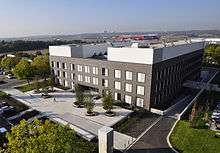Institute of Molecular Biology
The Institute of Molecular Biology (IMB) is a newly established research centre on the campus of the Johannes Gutenberg University of Mainz, Germany. It is funded by the Boehringer Ingelheim Foundation. The scientists at IMB primarily conduct basic science in developmental biology, epigenetics, and DNA repair.
| Established | 2010 |
|---|---|
| Focus | developmental biology, epigenetics, DNA repair |
| Location | , |
| Website | www.imb-mainz.de |
History
- In early 2009 the Boehringer Ingelheim Foundation decided to fund a new centre of excellence in the life sciences.
- The federal state of Rhineland-Palatinate financed the construction of a new building, starting in December 2009 on the campus of the University of Mainz.
- In May 2010 developmental biologist Christof Niehrs (formerly at the German Cancer Research Center, DKFZ) was appointed as the institute's founding director. The institute was then named „Institute of Molecular Biology“ and the institute's research focus on developmental biology, epigenetics, and DNA repair was set.
- The major part of the IMB building was inaugurated in March 2011.
- In July 2011 the first five research groups started their work at IMB.
- Three more groups followed in January 2012.
Research
The fields of developmental biology, epigenetics, and DNA repair constitute the framework of IMB's research. Many of the most interesting questions occur at the interfaces between these fields and IMB's research groups aim to address these questions.
The following research groups are currently working at IMB:
- Super-resolution Microscopy of Functional Nuclear Nanostructure (Christoph Cremer)
- Biology of non-coding RNA (René Ketting)
- Modelling Biological Regulatory Networks (Stefan Legewie)
- DNA Demethylation, DNA Repair and Reprogramming (Christof Niehrs)
- Gene Expression, Transcriptional Cycling and Dynamic DNA Methylation (George Reid)
- Epigenetic Mechanisms of Cellular Differentiation and Ageing (Holger Richly)
- Drosophila Development and RNA Processing (Jean-Yves Roignant)
- Epigenetic Regulation of Transcription in Mouse Development and Disease (Natalia Soshnikova)
The researchers are supported by IMB's Core Facilities which offer services and access to the newest technologies.
Infrastructure

IMB is housed in a new 6000 sq m research building with laboratories, offices, seminar rooms and a large auditorium. IMB is located in close proximity to many institutes of the Johannes Gutenberg University of Mainz, two Max Planck Institutes, the University of Applied Sciences Mainz, and the University Medical Center. Nearby Frankfurt and Darmstadt are also cities with extensive scientific activities, including the research of Goethe University Frankfurt, and the Technical University of Darmstadt.
References
- New international PhD programme in the Life Sciences, German Embassy, New Delhi, 02.01.2012.
- IMB - a new center for life science research, EMBO encounters, Winter 2011/2012, p. 14.
- Petra Giegerich: Festive opening of the Institute of Molecular Biology at Johannes Gutenberg University Mainz, innovations report, 16.03.2011.